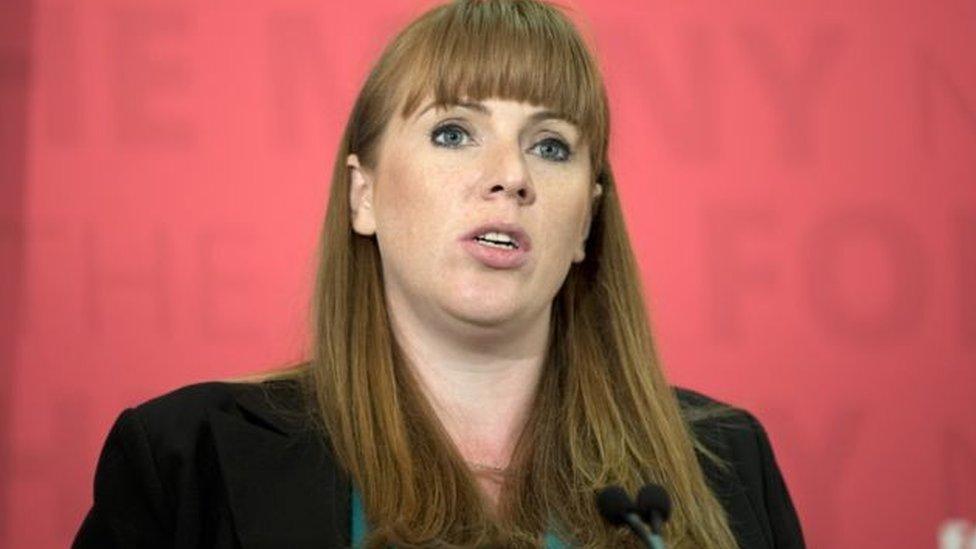Labour plans to scrap predicted grades system
- Published
- comments

Angela Rayner says Labour would change the system "by the end of our first term in office"
Labour says it would scrap the system of university places being offered on the basis of predicted grades and bring in a system of applying after results.
The party says the allocation of places on predicted grades is "deeply unfair".
But universities and schools say any changes would be complex and could mean an overhaul of the school calendar.
The proposals come as students across England, Wales and Northern Ireland prepare to receive their A-level and BTec results this week.
Research, external by the Department for Business Innovation and Skills in 2011 found 51.7% of all predictions were accurate, with 41.7% being over-predicted and 6.6% under-predicted.
Black applicants had the lowest percentage accuracy with only 39.1% of grades accurately predicted, while white applicants had the highest grade prediction accuracy at 53%.
Shadow education secretary Angela Rayner said "radical change" was needed for university admissions and is promising a new system of post-qualification admissions "by the end of our first term in office".
Ms Rayner said predicted grades were wrong "in the vast majority of cases" and disadvantaged students "lost out on opportunities on the basis of those inaccurate predictions".
"No-one should be left out of our education system just because of their background," she said, "yet with grants scrapped and fees tripled, the system is now deeply unfair.
"A Labour government will deliver the reform that is needed... we will put students at the heart of the system, making it fairer, more accurate, and a genuine vehicle for social justice."
Ms Rayner acknowledged the move may require changes to the school calendar but said a Labour government would consult and work with the sector to design and implement the new system.
"We may have to look at then calendar and we are willing to do that because what we believe is more important is that students get the opportunity to get the best university for them based upon their actual grades," she told BBC Radio 4's Today programme.
'Complex change'
Universities and schools say the proposals are not straightforward.
Clare Marchant, chief executive of the admissions service, Ucas, acknowledged a post-qualifications admissions (PQA) service had "a natural appeal".
But she said a UK-wide consultation it had carried out in 2012 had showed that "if introduced wholesale within the current timetables, it would be likely to significantly disadvantage under-represented and disabled students, unless secondary and/or university calendars changed".

Black students have the lowest level of grade prediction accuracy, figures show
Ms Marchant said disadvantaged students were more likely to be over-predicted, "which can encourage them to make aspirational choices, with universities making realistic offers and taking near-miss candidates when confirming places".
Under the current system, the Ucas boss added, about 78% of applicants received their first choice of university or college, regardless of their background.
"Clearing provides a PQA service for those students who want to wait until they have their results before applying. And in 2018, more than 17,500 students were accepted directly through this route," she said.
Ms Marchant said developing a PQA service that worked for everyone would need the support of students, teachers, qualification awarding bodies, the Student Loans Company, and universities and colleges, as well as a solution to timescale challenges.
And Geoff Barton, general secretary of the Association of School and College Leaders, said changing the current system would "represent a significant and complex change".
"It would be extremely difficult to manage the entire applications process in the few weeks between A-level results in mid-August and the beginning of university terms in September or October and it is likely that we would need to rethink the entire calendar.
"It might be simpler to return to a system in which AS-levels counted towards the first year of the full A-level, as this allowed universities to use actual results in considering applications."
But Jo Grady, general secretary of the University and College Union, said Labour's plan would "help level the playing field for students, remove the problems associated with unconditional offers and end the chaotic clearing scramble".
"The current system, based on inaccurately predicted results, is failing students and it is time we adopted the type of system used around the rest of the world, where university offers are based on actual achievements instead of guesswork," she said.
Universities UK, which represents higher education institutions, is currently carrying out a review of the admissions process and is due to report back next spring.